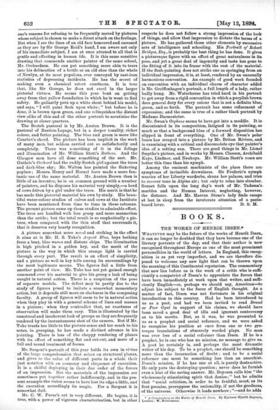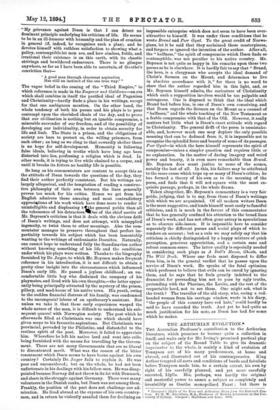BOOKS.
THE WORKS OF HENRIK IBSEN.*
WHATEvEit may be the future of the works of Henrik Ibsen,. it can no longer be doubted that they have become one of the- literary portents of the day, and that their author is now' recognised throughout Europe as one of the most prominent personalities in the world of letters. In England, this recog- nition is as yet very imperfect, and we are therefore dis- posed to welcome any new light that can be thrown upon the meaning of this Continental reputation. The commentary that now lies before us is the work of a critic who is suffi- ciently a compatriot of Ibsen's to appreciate the forces that have been immediately at work upon that writer, and suffi- ciently English—or, perhaps we should say, American—to- adjust his subject to the focus of English thought. As a matter of fact, Ibsen was not fortunate in his original introduction to this country. Had he been introduced to- ns as a poet, and had we been invited to read Brand or Peer aynt in support of his claims, we should have been saved a good deal of idle and ignorant controversy as to his merits. But, as it was, he was presented to. us as a prophet and social reformer, and we were, asked to recognise his position at once from one or two gro- tesque translations of obscurely worded 'plays. No man was ever less of a social reformer than Ibsen. , If he is a prophet, he is one who has no mission, no message to give us. A poet he certainly is, and perhaps the most dramatic writer of his day. To be a prophet, one should be something more than the incarnation of doubt ; and to be a social reformer one must be something less than an anarchist. Ibsen's mission, if he has one at all, is purely destructive.. He only puts the destroying question; never , does he furnish even a hint of the saving answer. Mr. Boyesen bills him "the wholesomely stimulating spirit that denies ; " bat he admits that "social criticism, in order to be fruitful, must; as its first premise, presuppose the rationality, if not the goodness, of the universe. Otherwise it leads nowhere ;"—and he adds • A Commentary on the Works of Henrik Ibeem, By Hjalmar Hjorth Boren,
London: W. Heinemann. -- • - -
"My grievance against Ibsen is that I can detect no dominant principle underlying his criticism of life. He seems to be in an ill-humour with humanity and the plan of creation in general (if, indeed, he recognises such a plan), and he devotes himself with ruthless satisfaction to showing what a paltry, contemptible lot men are, and how aimless, futile, and ' irrational their existence is on this earth, with its chaotic strivings and bewildered endeavours. There is no glimpse anywhere, as far as I have been able to ascertain, of Go ethe's conviction that-
' A good man through obscurest aspiration Has still an instinct of the one true way.'"
The vague belief in the coming of the "Third Empire," to which reference is made in the Emperor and Galikean—an era which shall combine in itself the purified ideal of Paganism and Christianity—hardly finds a place in his writings, except for that one ambiguous mention. On the other hand, the whole tendency of both his poems and his plays is to pour contempt upon the cherished ideals of the day, and to prove that our civilisation is nothing but an ignoble compromise, a miserable surrender of our freedom, and of the possibility of developing our individuality, in order to obtain security for life and limb. The State is a prison, and the obligations of society are bars to protect us, the willing prisoners, from each other; as long as we cling to that cowardly shelter there is no hope for self-development. Humanity is following false ideals, believing in truths which have long ago been distorted into lies, professing a religion which is dead. In other words, it is trying to live while chained to a corpse, and until it breaks its fetters no healthy life is possible.
So long as his commentators are content to accept this as the attitude of Ibsen towards the questions of the day, they find their author perfectly consistent. But his writings are largely allegorical, and the temptation of reading a construc- tive philosophy of their own between the lines generally proves too much for his critics. Hence we get from his English admirers those amazing and most contradictory appreciations of his work which have done more to render it unintelligible and displeasing ttt he general public than all the vehemence of his detractors.W)ne of the chief merits of Mr. Boyesen's criticism is that it deals with the obvious drift of Ibsen's writings, and does not attempt, with misapplied ingenuity, to twist them to other meanings. Also the com- mentator manages to preserve throughout that perfect im- partiality towards his subject which has been lamentably wanting to the writings of enthusiastic Ibsenites. Naturally, one cannot hope to understand fully the Scandinavian author without knowing something of his life and the conditions
• under which his plays were written. Thanks to the biography furnished by Dr. Jaeger, to which Mr. Boyesen makes frequent reference in his introduction, it is not difficult to obtain a pretty clear insight into the circumstances which influenced Ibsen's early life. He passed a joyless childhood ; an un- comfortable little boy who disdained the company of his playmates, and lived with his own thoughts,—the latter appar- ently being principally attracted by the mystery of the prison, pillory, and mad-house of his native town. His youth, owing to the sudden financial distress of his family, was condemned • to the uncongenial labour of an apothecary's assistant. But unless we take it that these early experiences warped the • whole nature of the man, it is difficult to understand his sub- sequent quarrel with Norwegian society. The post which he afterwards filled at Christiania was one which should have given scope to his favourite aspirations. But Christiania was provincial, pervaded by the Philistine, and distasteful to the restless spirit of the poet. Moreover, it failed to appreciate him. Wherefore he left his native land and went into exile, being furnished with the means for travelling by the Govern- ment. There are not many Governments that are so liberal to discontented merit. What was the reason of the bitter ' resentment which Ibsen seems to have borne against his own ' country? Certainly Dr. Jmger fails to explain it. He was ' poor and unconsidered ; but on the whole, he had not been unfortunate in his dealings with his fellow-men. He was disap- pointed because Norway did not throw in its lot with Denmark, and share in the straggle against Germany. There were many • volunteers in the Danish ranks, but Ibsen was not among them.
• Frankly, the position of the poet does not challenge our ad- miration. He lived abroad at the expense of his own country- , men, and in return he violently assailed them for declining an impossible enterprise which does not seem to have been over- attractive to himself. It was under these conditions that he wrote Brand and Peer Gynt. To the great credit of Norwe- gians, let it be said that they acclaimed these masterpieces, and forgave or ignored the intention of the author. After all, the " halfness," the spirit of compromise which Ibsen finds so contemptible, was not peculiar to his native country. Mr. Boyesen is not quite so happy in his remarks upon these two poems as he is elsewhere. It is hardly fair to say that "Brand, the hero, is a clergyman who accepts the ideal demand of Christ's Sermon on the Mount, and determines to live in absolute accordance with it," for there is no word to show that the author regarded him in this light, and, as- Mr. Boyesen himself admits, the caricature of Christianity which such a supposition involves would be too palpable and outrageous. One is disposed to think that the ideal which. Brand had before him, is one of Ibsen's own conceiving, and that Ibsen regards the Sermon on the Mount as a counsel of " halfness," and the whole teaching of the New Testament as. a feeble compromise with that of the Old. However, it really matters but little what is Ibsen's exact attitude with regard to Christianity. The general drift of the poem is unmistake- able, and, however much one may deplore the only possible meaning that can be deduced from it, it is impossible not to recognise the splendid force and beauty of some of its passages. Peer G-ynt—in which the hero himself represents the spirit of compromise—raises a simpler question and requires little or no explanation. In the matter of daring imagery and weird power and beauty, it is even more remarkable than Brand. Mr. Boyesen does scant justice to some of the scenes, notably the last of all. In this, his failure may be attributed to the same cause which trips up so many of Ibsen's critics; he has formed a theory of his own as to the meaning of the poem, and finds that it will not square with the most ex- quisite passage, perhaps, in the whole drama.
Taken altogether, Mr. Boyesen's commentary is a very fair guide, judging, that is to say, from those of Ibsen's writings with which we are acquainted. Of all modern writers Ibsen is the most suggestive, and lends himself most easily to fanciful criticism, and it is much in the favour of this commentator- that he has generally confined his attention to the broad lines of Ibsen's work, and has not often gone astray in speculations as to obscure side-issues. It is impossible here to consider separately the different poems and social plays of which he renders an account; but as a rule we may safely say that his criticism is chiefly distinguished by a happy mixture of quick perception, generous appreciation, aud a certain sane and robust common-sense. The latter quality is especially needed in considering such plays as A Doll's House, Ghosts, and The Wild Duck. Where one feels most disposed to differ from him, is in the general verdict that he passes upon the service of Ibsen's work. He speaks of the fatal optimism which professes to believe that evils can be cured by ignoring them, and he Bays that he feels greatly indebted to the dramatist for persuading him not to pass by ugly truths, pretending with the Pharisee, the Levite, and the rest of the respectable herd, not to see them. One might ask, what is the truth ? The traveller of the old story, who, seeing a red- headed woman from his carriage window, wrote in his diary, "the people of this country have red hair," could hardly be said to have recorded the truth. And yet he had quite as much justification for his note, as Ibsen has bad for some which he makes.



































 Previous page
Previous page